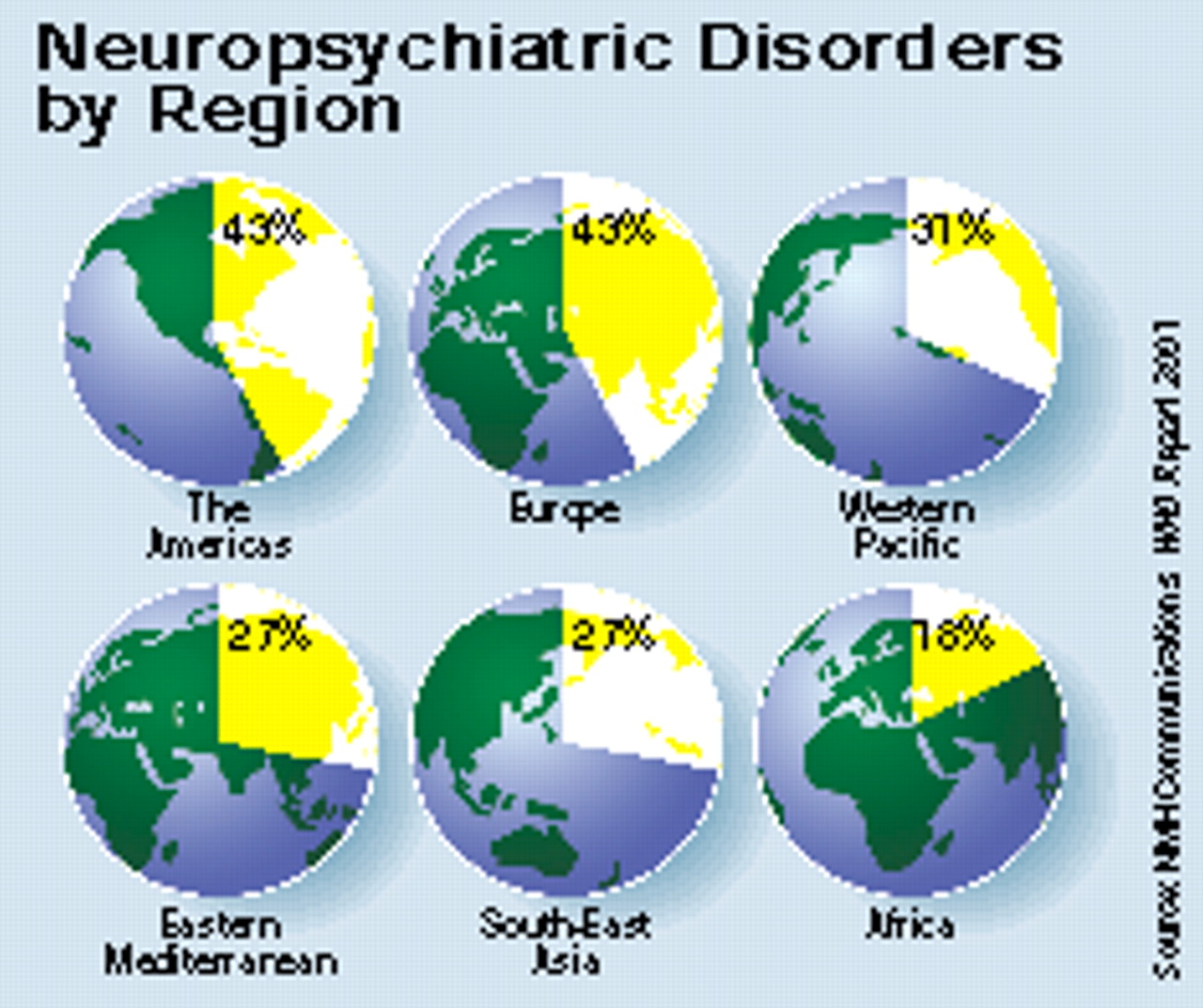The World Health Organization has done something unprecedented this year—it has devoted both its World Health Day and its World Health Report to a single topic.
WHO dedicated its World Health Day on April 7 to mental health, with the goal that it would galvanize leaders and policymakers around the world to improve care for people with mental illness (Psychiatric News, February 2). And now WHO has devoted its World Health Report 2001 to mental health as well.
The report contains five chapters. Chapter one discusses mental health in general and explains why it is as important as physical health to the overall well-being of individuals, families, communities, and societies.
Chapter two addresses the treatment gap as one of the most important issues in mental health today. It states that throughout the world, mental and neurological disorders account for 12 percent of the total disability-adjusted life years lost due to all diseases and injuries, yet only a small minority of people receive any treatment.
Chapter three is concerned with shifting from institutionalized care to care in the community. In practice, community care implies the development of a wide range of services within local settings. This process, which has not yet begun in many regions and countries, aims to ensure that some of the protective functions of the asylum are fully provided and that the negative aspects of the institutions are not perpetuated. However, this chapter warns against closing mental hospitals without community alternatives and, conversely, creating community alternatives without closing mental hospitals. Both have to occur at the same time, in a well-coordinated, incremental way.
Chapter four deals with mental health policy and service provision. “Governments, as the ultimate stewards of mental health, need to assume the responsibility for ensuring that these complex activities are carried out,” the report states. “People should be protected from catastrophic financial risk, which means minimizing out-of-pocket payments in favor of prepayment methods, whether via general taxation, mandatory social insurance, or voluntary private insurance. The healthy should subsidize the sick through prepayment mechanisms, and a good financing system will also mean that the well-off subsidize the poor, at least to some extent.”
This chapter also points out that the public mental health budget in many countries is mainly spent on institutional care, with few resources being made available for more effective community services. The chapter also notes that in most countries mental health services need to be reevaluated and reformed to provide the best available treatment.
Finally, chapter five contains recommendations and three scenarios for action. These are among the report’s recommendations:
• Provide treatment for mental disorders in primary care settings. The management and treatment of mental disorders in primary care is a fundamental step that enables the largest number of people to get easier and faster access to services—it needs to be recognized that many are already seeking help at this level.
• Make psychotropic drugs available at all levels of health care. These medicines should be included in every country’s essential-drugs list, and the best drugs to treat conditions should be made available whenever possible. In some countries, this may require enabling legislation changes.
• Provide mental health care through community-based services. Community care has a better effect than institutional treatment on the outcome and quality of life of individuals with chronic mental disorders.
• Educate the public about mental illnesses. The main goal is to reduce barriers to treatment and care by increasing awareness of the frequency of mental disorders, their treatability, the recovery process, and the human rights of people with mental disorders.
• Involve communities, families, and consumers in the development of mental health services. Such involvement should lead to services being better tailored to people’s needs and better used.
• Establish mental health policies, programs, and legislation for sustained action. Most countries need to increase their budgets for mental health programs from current low levels.
• Develop mental health resources. Most developing countries need to increase and improve training of mental health professionals, who will provide specialized care as well as support the primary health care programs.
• Get sectors such as education, labor, welfare, and law involved in improving the mental health of communities.
• Monitor community mental health by including mental health indicators in health information and reporting systems.
• Support more research into the biological and psychosocial aspects of mental health to increase the understanding of mental disorders and to develop more effective interventions.
The first scenario for action—Scenario A—applies to economically poorer countries where resources are absent or very limited: They should train personnel, make essential drugs available at all health facilities, and move the mentally ill out of prisons.
Scenario B applies to countries with modest resources: They should close custodial mental hospitals and integrate mental health care into general health care.
Scenario C applies to countries with the most resources: They should improve the management of mental disorders in primary health care, ease access to newer drugs, and have community care facilities offer a full range of mental health services.
Darrel Regier, M.D., director of APA’s Office of Research and executive director of the American Psychiatric Institute for Research and Education, was involved in the preparation of the report as an adviser to WHO and as a consultant on the report. WHO also sought the input of other leading psychiatrists and mental health professionals around the world in preparing the report.
The report is being sent to all 190 WHO member states, the hundreds of nongovernmental organizations that have an official relationship with WHO, the international media, all WHO collaborating centers, the public health community, and anyone from the general public who asks for it.
What kind of influence might the report have on world mental health? Psychiatric News asked this question of Reshma Prakash, a WHO information officer in Geneva, Switzerland, as well as of Regier. Prakash said that WHO is hoping the report will “update governments, policymakers, and the general public on the latest data on mental health and bring home to governments the importance of putting more resources into mental health and formulating the right kind of policies to address the mental health needs of their people.”
Said Regier, “I hope that the report will have the same impact on a global basis that we have had from the surgeon general’s mental health report on a national basis, which is to really raise the level of appreciation of the importance of mental health as a fundamental component of any health care program. For instance, in many countries around the world mental health remains much more separate from the rest of medicine than it does even here in the United States. I would like to see the report correct that situation—that is, get people in various countries to integrate mental health care into the mainstream of health care.”
“The World Health Report 2001—Mental Health: New Understanding, New Hope” can be accessed on the Web at www.who.int/whr/ by clicking on “contents.” ▪

